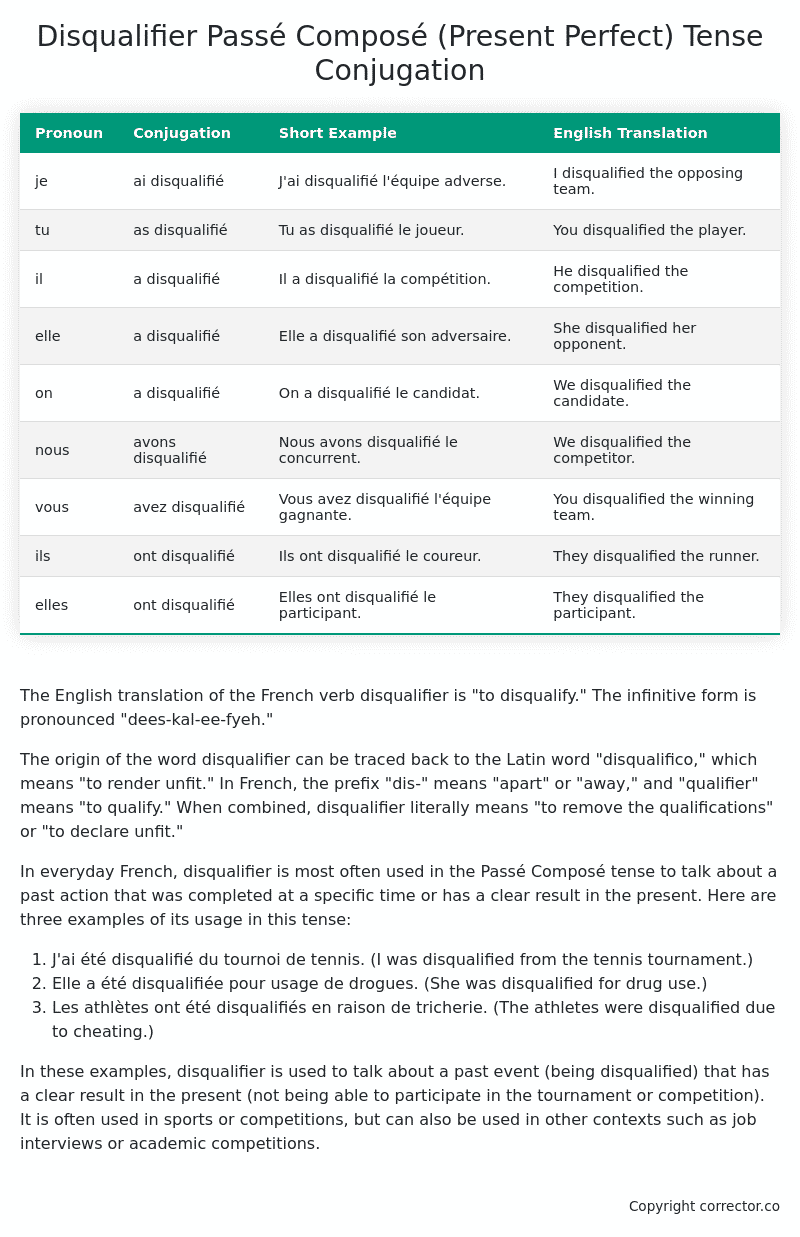Passé Composé (Present Perfect) Tense Conjugation of the French Verb disqualifier
Introduction to the verb disqualifier
The English translation of the French verb disqualifier is “to disqualify.” The infinitive form is pronounced “dees-kal-ee-fyeh.”
The origin of the word disqualifier can be traced back to the Latin word “disqualifico,” which means “to render unfit.” In French, the prefix “dis-” means “apart” or “away,” and “qualifier” means “to qualify.” When combined, disqualifier literally means “to remove the qualifications” or “to declare unfit.”
In everyday French, disqualifier is most often used in the Passé Composé tense to talk about a past action that was completed at a specific time or has a clear result in the present. Here are three examples of its usage in this tense:
- J’ai été disqualifié du tournoi de tennis. (I was disqualified from the tennis tournament.)
- Elle a été disqualifiée pour usage de drogues. (She was disqualified for drug use.)
- Les athlètes ont été disqualifiés en raison de tricherie. (The athletes were disqualified due to cheating.)
In these examples, disqualifier is used to talk about a past event (being disqualified) that has a clear result in the present (not being able to participate in the tournament or competition). It is often used in sports or competitions, but can also be used in other contexts such as job interviews or academic competitions.
Table of the Passé Composé (Present Perfect) Tense Conjugation of disqualifier
| Pronoun | Conjugation | Short Example | English Translation |
|---|---|---|---|
| je | ai disqualifié | J’ai disqualifié l’équipe adverse. | I disqualified the opposing team. |
| tu | as disqualifié | Tu as disqualifié le joueur. | You disqualified the player. |
| il | a disqualifié | Il a disqualifié la compétition. | He disqualified the competition. |
| elle | a disqualifié | Elle a disqualifié son adversaire. | She disqualified her opponent. |
| on | a disqualifié | On a disqualifié le candidat. | We disqualified the candidate. |
| nous | avons disqualifié | Nous avons disqualifié le concurrent. | We disqualified the competitor. |
| vous | avez disqualifié | Vous avez disqualifié l’équipe gagnante. | You disqualified the winning team. |
| ils | ont disqualifié | Ils ont disqualifié le coureur. | They disqualified the runner. |
| elles | ont disqualifié | Elles ont disqualifié le participant. | They disqualified the participant. |
Other Conjugations for Disqualifier.
Le Present (Present Tense) Conjugation of the French Verb disqualifier
Imparfait (Imperfect) Tense Conjugation of the French Verb disqualifier
Passé Simple (Simple Past) Tense Conjugation of the French Verb disqualifier
Passé Composé (Present Perfect) Tense Conjugation of the French Verb disqualifier (this article)
Futur Simple (Simple Future) Tense Conjugation of the French Verb disqualifier
Futur Proche (Near Future) Tense Conjugation of the French Verb disqualifier
Plus-que-parfait (Pluperfect) Tense Conjugation of the French Verb disqualifier
Passé Antérieur (Past Anterior) Tense Conjugation of the French Verb disqualifier
Futur Antérieur (Future Anterior) Tense Conjugation of the French Verb disqualifier
Subjonctif Présent (Subjunctive Present) Tense Conjugation of the French Verb disqualifier
Subjonctif Passé (Subjunctive Past) Tense Conjugation of the French Verb disqualifier
Subjonctif Imparfait (Subjunctive Imperfect) Tense Conjugation of the French Verb disqualifier
Conditionnel Présent (Conditional Present) Tense Conjugation of the French Verb disqualifier
Conditionnel Passé (Conditional Past) Tense Conjugation of the French Verb disqualifier
L’impératif Présent (Imperative Present) Tense Conjugation of the French Verb disqualifier
L’infinitif Présent (Infinitive Present) Tense Conjugation of the French Verb disqualifier
Struggling with French verbs or the language in general? Why not use our free French Grammar Checker – no registration required!
Get a FREE Download Study Sheet of this Conjugation 🔥
Simply right click the image below, click “save image” and get your free reference for the disqualifier present perfect tense conjugation!

Disqualifier – About the French Passé Composé (Present Perfect) Tense
Formation of the Passé Composé
Set the auxiliary verb with either
Conjugate the auxiliary verb
Add the past participle
Common everyday usage patterns
Narrating Past Events
Sequential Actions
Describing Completed Actions
Interactions with other tenses
Imperfect Tense
Conditional and Future Tenses
Summary
I hope you enjoyed this article on the verb disqualifier. Still in a learning mood? Check out another TOTALLY random French verb conjugation!


